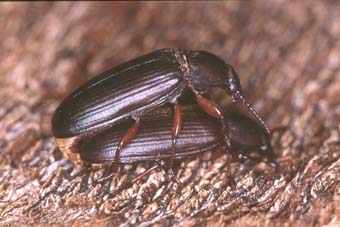
Scientists of Cavanilles Institute of Biodiversity and Evolutionary Biology of the University of Valencia and Oxford University have discovered, in a work published by the journal Frontiers in Psychology that the beetle known as mealworm beetle (Tenebrio molitor), is capable of counting the number of rival males with which competes for a female before mating and makes this using a cognitive ability that was thought exclusive of vertebrates.
The males of this species of coleoptera have to face a fierce competition to fertilize the females, as after mating they run the risk that other rival males copulate with the same female and remove their sperm (through a specialized structure that appear in their penis). In order the sperm of the male is out of danger, that is to say that the sperm remain stored in the female, there are need seven or ten minutes, a key period in which the mealworm beetle remains vigilant and dedicates more or less time watching over the female depending on the amount of rivals .
“When there are few rivals and the risk that other male replace his sperm is very low, the males abandon the female few seconds after the copulation, to look for food or other females”, says Pau Carazo, principal researcher of the study in which have participated Enrique Font i Reyes Fernández-Perea. However, as grows the density of males around and the risk that the female mate with a second male increases, males also increases the time they remain with the female after the copulation-called ‘couple guard’, to prevent that this mate with other males and to make sure that his sperm is not lost.
A SHARED SKILL WITH VERTEBRATES
Recent results of experiments, such as those published by the same group of the University of Valencia in 2009, had already shown that some species of insects have the ability to estimate the number of objects in a group approximately. This ability is very advantageous in many contexts (as for example, when an insect has to decide what plant to visit is very beneficial to know which contains more flowers). However, it was thought that the cognitive mechanisms that insects used to estimate the number of objects in a group had little to do with what we understand as counting. In the example above the flower that has more colors, or a wider floral surface, and was considered that the insects take these continuous variables into account to estimate the number of objects in a group.
The work of the University of Valencia, however, suggests that mealworm beetles are capable of determining the number of objects in a group without using continuous variables; they recognize individually each individual and accumulate in their memory the number of different individuals that they find to appreciate the total number of them in their immediate environment.
This finding has a wider scope than mere curiosity. “In recent years, it has been discovered that basic cognitive characters that allow us to count- underlying our mathematic abilities- are shared with many other species of vertebrates and, now invertebrates, which means that these could be common to all of them and probably are most widely spread of what was suspected” said Carazo.
The discovered ability in mealworm beetles and which gathers the characteristics of what is called proto-counting, differs from what we understand as counting for humans, as doesn’t imply an abstract concept of number. “This allows to generalize the same principle to any object, even to groups of different objects and not just to individuals of the same species, as in the case of the mealworm beetle” explains the scientist.
More information: www.uv.es/cdciencia
Last update: 15 de january de 2013 10:36.
News release



















